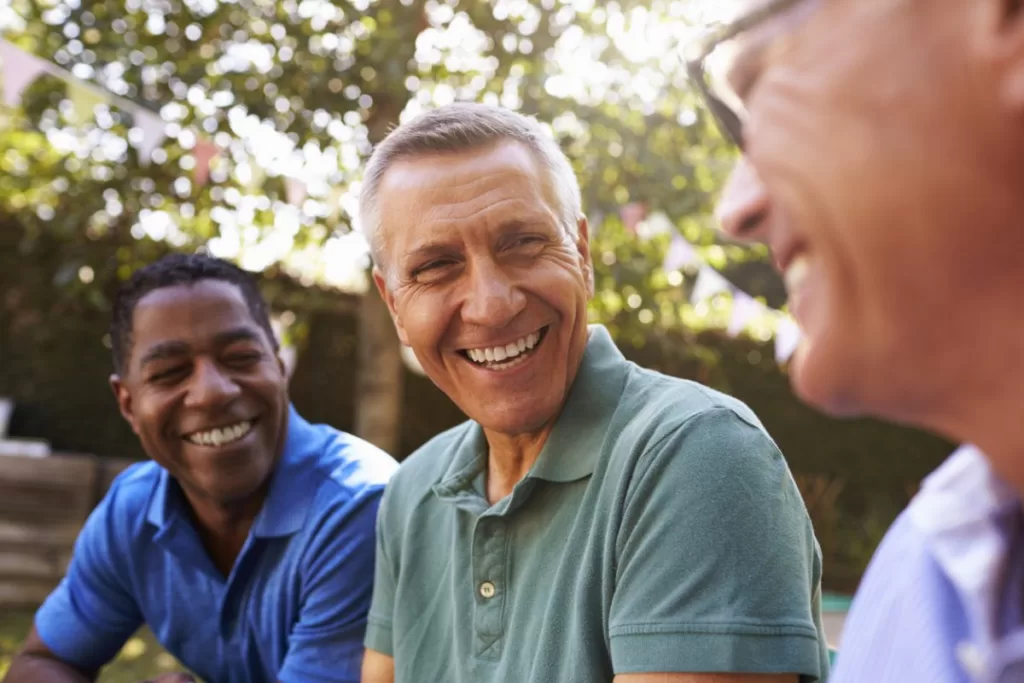Men's Mental Health Matters: The Positive Impact of Therapy Groups on Wellness
Ever wondered if there’s a transformative way for men to navigate life’s challenges while enhancing their mental well-being? In a world where discussions around mental health are gaining momentum, these groups offer a unique and supportive space for men to share their experiences, fears, and triumphs openly. Breaking away from traditional stereotypes, men’s therapy groups provide an environment where vulnerability is embraced, connections are fostered, and personal growth takes center stage. In this blog, it delves into the transformative impact of it, unveiling the benefits they offer and the possibilities they hold for boosting men’s mental wellness.
What is Men's Mental Health?
Men’s mental health can be significantly impacted in a society where the emphasis on masculinity often discourages vulnerability and emotional expression. Men are expected to adhere to stoic ideals, which can lead to suppressed emotions and untreated mental struggles. Recognizing the importance of addressing this issue, the concept of it has emerged as a transformative approach to boosting mental wellness.

Societal Influences And Stigma
Traditional gender roles have perpetuated the idea that men should be strong, self-reliant, and unemotional. These expectations can create a toxic environment where men feel pressure to suppress their emotions and hide their struggles. As a result, many men suffer in silence, hesitant to reach out for support due to the stigma surrounding mental health issues.
The Need for Men-Centered Approaches
To effectively address men’s mental health, it’s crucial to tailor therapeutic approaches to their unique needs. It provides a safe space where men can connect with others who share similar experiences. These groups encourage open communication, allowing men to express themselves without fear of judgment. The group setting helps break down the isolation many men feel, fostering community and support.
Breaking Down Stigma and Stereotypes
The landscape of mental health is evolving, and with it comes a shift in perceptions surrounding men’s mental wellness. Traditionally, society has conditioned men to be strong, unemotional, and self-reliant, often discouraging them from seeking help for their mental health concerns. However, the emergence of it is challenging these long-standing stigmas and stereotypes, opening a new avenue for men to prioritize their mental well-being.
Benefits Of Group Therapy
Compared to individual therapy, it offers a distinct set of benefits that can significantly enhance mental wellness:
- Shared Experience: Group members often find solace in realizing they are not alone in their struggles. Listening to others’ stories and sharing one’s experiences creates a sense of connection and reduces feelings of isolation.
- Diverse Perspectives: Group members come from varied backgrounds, which leads to a rich tapestry of insights and perspectives. This diversity broadens participants’ understanding of their situations and potential solutions.
- Peer Support: Group therapy fosters a unique sense of camaraderie. Participants offer support, validation, and encouragement to one another, promoting a feeling of belonging and acceptance.
- Social Skills Enhancement: Interacting with others in a safe environment helps men develop better communication and interpersonal skills. These skills often extend beyond the group setting, positively impacting personal and professional relationships.
- Safe Vulnerability: Men can learn to embrace vulnerability without judgment, allowing them to express their emotions honestly and authentically.
Therapeutic Approaches In Men's Therapy Groups
Different therapy approaches are employed in it to cater to diverse needs:
- Cognitive-Behavioral Therapy (CBT): Focuses on identifying and modifying negative thought patterns and behaviors contributing to mental distress.
- Mindfulness-Based Therapy: Emphasizes staying present, cultivating self-awareness, and managing stress through mindfulness techniques.
- Interpersonal Therapy: Aims to improve interpersonal relationships and communication skills by exploring relationship patterns.
- Psychoeducation: Involves educating participants about mental health, teaching coping skills, and providing strategies for managing symptoms.
Challenging Traditional Notions of Masculinity
The stereotypical image of a man as stoic and unemotional has long been ingrained in society’s psyche. This stereotype, while detrimental, has prevented many men from seeking the help they need. It provides an antidote to this toxic narrative by offering a space where participants can share their emotions, fears, and vulnerabilities without fear of judgment. These groups emphasize that strength lies not in suppressing emotions but in acknowledging and addressing them. By encouraging open dialogue, these groups redefine masculinity as multidimensional and emotionally intelligent, breaking down the barriers that have hindered men from seeking therapy.
Normalizing Seeking Help
Participating in it can normalize seeking help for mental health issues. When men come together to share their experiences, they demonstrate that seeking therapy is not a sign of weakness but a courageous step toward self-improvement. As more men engage in these groups, the collective impact is a gradual shift in societal attitudes. The normalization of therapy can extend beyond the group setting, encouraging men to seek professional help and promoting healthier coping mechanisms.
Learning Effective Communication
Open Dialogue and Emotional Management
Open dialogue is at the heart of men’s therapy groups. Participants are encouraged to express themselves without fear of ridicule or judgment. This open dialogue allows men to explore their emotions, understand their triggers, and work towards managing their emotional struggles. Through sharing their experiences and listening to others, men can gain valuable insights into their emotions and develop a deeper understanding of themselves.
In a world that often promotes a stoic and self-reliant image of masculinity, men can find it challenging to express their emotions and communicate effectively. However, it is emerging as a transformative space that boosts mental wellness and fosters essential communication skills.
Practical Examples Of Improved Communication
Improved communication skills can have a profound impact on mental wellness. Here are a few practical examples of how men benefit from enhanced communication within therapy groups:
- Reduced Isolation: Many men feel isolated when dealing with mental health challenges. Effective communication within a therapy group helps them realize that they are not alone in their struggles, fostering a sense of connection and belonging.
- Emotion Regulation: Learning to express emotions verbally can aid in regulating intense feelings. Men can better articulate their emotions, helping them manage stress, anxiety, and anger more effectively.
- Conflict Resolution: Communication skills learned in therapy groups extend beyond the sessions. Men can apply these skills to resolve conflicts in their personal and professional lives, leading to healthier relationships.
- Healthy Coping Mechanisms: Sharing coping strategies and experiences with peers can give men a toolkit of healthy ways to deal with challenges, reducing the likelihood of turning to harmful coping mechanisms.
- Self-Awareness: Through active listening and reflection, men can better understand their emotions and thought patterns. This self-awareness is essential for personal growth and emotional well-being.
The Power of Men's Therapy Groups
Men often face unique societal pressures that make opening up about their emotions and struggles challenging. It creates a safe and non-judgmental space for men to share their thoughts and feelings without fear of being stigmatized. Here are some of the potential benefits of participating in such groups:
- Camaraderie and Connection: It offers a sense of camaraderie and connection with others who may be facing similar challenges. Sharing experiences with peers who understand and empathize can alleviate isolation and loneliness.
- Validation and Acceptance: Being part of a group where individuals share their vulnerabilities promotes a sense of validation and acceptance. This can help men feel understood and valued, reducing self-doubt and boosting self-esteem.
- Diverse Perspectives: In a therapy group, participants come from various backgrounds and experiences. This diversity provides a range of perspectives that can offer fresh insights and solutions to personal challenges.
- Skill Building: It often incorporates therapeutic techniques and coping strategies to help participants develop practical skills for managing stress, anxiety, and other mental health issues.
- Personal Growth: By openly discussing their experiences and learning from others, men can embark on a journey of self-discovery and personal growth.
Finding the Right Group
Choosing the right men’s therapy group ensures a positive and practical experience. Here are some factors to consider:
- Group Dynamics: Look for a group that fosters a supportive and respectful atmosphere. Group dynamics play a significant role in the effectiveness of therapy groups.
- Therapist Qualifications: Ensure that the therapy group is facilitated by qualified professionals with experience in group therapy and expertise in men’s mental health issues.
- Group Focus: Some therapy groups may focus on specific topics, such as stress management, relationship issues, or anger management. Choose a group that aligns with your current needs and concerns.
- Location and Accessibility: Consider the location of the therapy group and whether it is accessible for you. Online therapy groups are also becoming increasingly popular for their convenience and flexibility.
- Confidentiality: Confidentiality is paramount in therapy groups. Ensure that the group has clear guidelines for maintaining the privacy and confidentiality of participants.
In a world where the stigma around mental health is gradually diminishing, men’s therapy groups emerge as a powerful avenue for enhancing mental wellness. These groups offer a unique platform where men can share, connect, and grow together, fostering a sense of camaraderie and acceptance. The benefits of joining such groups, from gaining diverse perspectives to developing practical coping skills, are undeniable. Remember that finding the right group is key if you consider taking this empowering step toward improved mental health. Prioritize factors like group dynamics, therapist qualifications, and your personal needs. If you’re ready to embark on this transformative journey, don’t hesitate to contact therapy groups that resonate with you. Your mental well-being matters – take the step and contact us at 3022136158 to explore the potential of men’s therapy groups in boosting your overall wellness.





